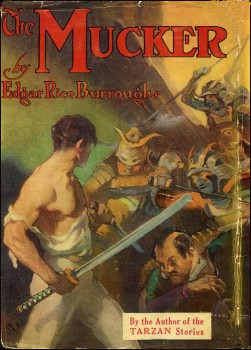Poetry in Action: The Return of the Mucker by Edgar Rice Burroughs
 This upfront: The Return of the Mucker is less effective a novel than last week’s topic, The Mucker. The strange genre-mashings of the first book give way to the more familiar settings of the American southwest and northern Mexico. The Return of the Mucker plays as an outright Western for most of its length, and offers nothing as lunatic as samurai cannibals. As a story, it doesn’t hold together as well as The Mucker, getting weighed down with too much plot “business” while the first book stripped away extraneous aspects the farther the story advanced until it came down to only the hero and heroine, Billy Byrne and Barbara Harding.
This upfront: The Return of the Mucker is less effective a novel than last week’s topic, The Mucker. The strange genre-mashings of the first book give way to the more familiar settings of the American southwest and northern Mexico. The Return of the Mucker plays as an outright Western for most of its length, and offers nothing as lunatic as samurai cannibals. As a story, it doesn’t hold together as well as The Mucker, getting weighed down with too much plot “business” while the first book stripped away extraneous aspects the farther the story advanced until it came down to only the hero and heroine, Billy Byrne and Barbara Harding.
Yet The Return of the Mucker is still a strong work that glosses over its shaky plot elements with a breakneck action finale, fitting developments of Billy Byrne’s personality that merge together his extremes, and one of Burroughs’s most intriguing characters: a hobo-poet hero named Bridge.
Burroughs’s working title for The Mucker’s sequel was Out There Somewhere, the name of a poem that inspired the character of Bridge. (More about that later.) Burroughs submitted the novel to All Story in March 1916, soon after completing it. Editor Thomas Newell Metcalf purchased the story immediately, and the first of five installments appeared two months later under its more marketable title. The Return of the Mucker was published in hardcover in 1921 from A. C. McClurg as Part II of a volume simply called The Mucker.
When the story begins, Billy Byrne is no longer “the mucker.” ERB makes that clear as a cloudless blue sky in the second paragraph: “Billy Byrne was no longer the mucker.” Barbara Harding cured Byrne of his criminal life and coarse ways: everything that defines the now outdated slang term “mucker.” But Billy Byrne surrendered his love for Barbara so she could marry William Mallory at the conclusion of the first book, and he’s now a man without direction — or a complete personality. If he isn’t the mucker, and he’s not with the woman who changed him, what is he? …
